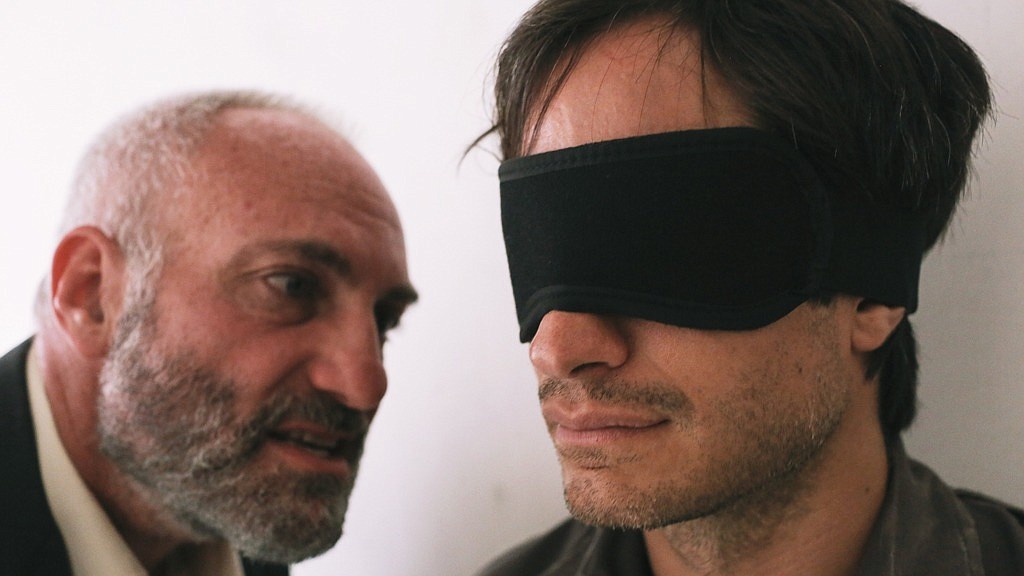- May 14, 2025
-
-
Loading

Loading

Movies based on true stories can be treacherous ventures for directors. When done right, and for the right reasons, a cinematic account of a historical event can be transcendent, inspiring and often personal filmmaking. But when done wrong, a true-story film can be melodramatic, preachy and ineffectual. Moviegoers will be thankful to know that Jon Stewart’s (yes, that Jon Stewart) directorial debut film “Rosewater” falls into the former category.
Based on Iranian-Candian reporter Maziar Bahari’s time reporting on Iran’s contentious 2009 presidential election, the film depicts Bahari’s life before, during and after being taken prisoner by the Iranian government for being a spy for the Western media. And the personal flair that separates “Rosewater” from most historical films is the director's immediate connection with Bahari’s torturous captivity.
[video id="GGOYHIqmmiM" site="youtube"][/video]
It was a “Daily Show” segment that featured Bahari talking with comedic correspondent Jason Jones in Iran about the things Americans and Iran ians had in common that landed Bahari in hot water with Iranian intelligence. They didn’t appreciate the joke. Comparing the people of Iran and the United States with an American comedian/reporter referring to Bahari as a spy, posting video of post-election protests to his employers at “Newsweek,” and having a father and sister who were imprisoned for their Communistic beliefs did not endear him to Iranian intelligence. Bahari was taken from his mother’s house and kept as a political prisoner for 118 days.
So, Stewart’s film is indeed a labor of love and personal sacrifice. Payment in kind for Bahari’s stirring resolve and fortitude, and as one of the country’s foremost news broadcasters (even if he is a comedian), it's a story that all journalists can relate to. And now, with reporters and aid workers being killed or held hostage by ISIS and other foreign powers, “Rosewater” and its message of resilience and freedom of the press is needed more than ever.
Stewart is earnest and passionate in his direction of Bahari’s (played by a fantastic Gael García Bernal) story. The scope and scale of the Iranian presidential election and Bahari’s role within that fight established a firm sense of time in a Middle East just on the cusp of the tumultuous Arab Spring. Stewart’s unfolding of the events leading up to Bahari’s imprisonment is presented in a conventional fashion, which makes his eventual capture that much more absurd and unexpected. Visually, the most inconsequential moment is Bahari’s sit-down with Jason Jones. A lighthearted interview that's all the more impactful because of its unseen reverberations.
The meat of the film though revolves around Bahari’s intolerable time in Iranian captivity. His handler/tormentor is simply named Rosewater (played by Kim Bodnia) for the scented fragrance of rose petals. Bahari and Rosewater’s relationship is a complicated and frank depiction of prisoner and captor. There isn’t any waterboarding, psychological torment or electrocution, just fists and the mental anguish of solitary confinement. In order to maintain his sanity, Bahari starts talking to the memories of his father and older sister ,who both experienced extended prison time at the hands of the Iranian government.
Bernal continues to impress, and “Rosewater” offers him a chance to flex his acting chops with several extended sequences where Bernal is in isolation with only his thoughts and memories as tools to survive. The first time he's allowed to call his wife after months of captivity is devastating, and his series of duets with his handler, Rosewater, are torturous in their nefarious simplicity. Stewart aims his lens at Bernal’s inner history, and through it, reflects Iran’s arduous political and cultural evolution in the modern world.
If Jon Stewart somehow still feels any residual guilt for his show’s involvement in Bahari’s containment, then “Rosewater” is plenty penance. It’s a film about today’s tumultuous global and political climate that neither preaches, goes overblown in torture, or fights for any overt political party. It's a somber yet striking look at one man’s struggle for freedom and peace at the hands of his homeland. Though Stewart has made a career out of being seriously silly, he has a knack for transcendent and earnest filmmaking. Whenever that fateful day arrives when he vacates the “Daily Show” desk, I hope Stewart still keeps his eye on current events, attacking the wrongs of the daily news, not with a sketch show, but with a movie camera.